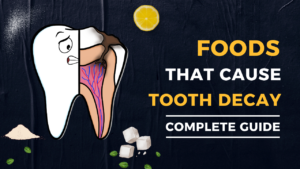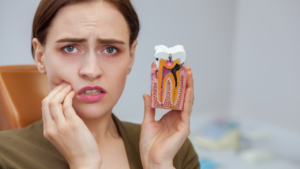Introduction
Tooth decay, also known as dental caries or cavities, is a common dental issue caused by bacteria, acid, and poor oral hygiene. But did you know that your diet plays a major role in how quickly your teeth deteriorate? Certain foods, especially those high in sugar, acid, and carbohydrates, can fuel harmful bacteria in your mouth, leading to plaque buildup, enamel erosion, and cavities.
In this article, we will explore:
✔ The worst foods for your teeth and why they cause decay
✔ Hidden sources of sugar that damage teeth
✔ How to protect your teeth from decay while enjoying your favorite foods
Top Foods That Cause Tooth Decay
Some foods are more harmful to your teeth than others because they are high in sugar, acid, or stick to your teeth for long periods. Here are the worst offenders:

1. Sugary Drinks (Soda, Juice, Sports Drinks, Energy Drinks)
✔ These drinks contain high levels of sugar and acid, which fuel bacteria and erode tooth enamel.
✔ Even diet sodas contain acidic ingredients that weaken teeth over time.
✔ Fruit juices, even 100% natural ones, are high in natural sugars and acids.
Tip: Drink water or unsweetened beverages instead. If you drink sugary drinks, use a straw to minimize contact with teeth.
2. Candy and Sweets (Hard Candy, Gummies, Caramel, Lollipops)
✔ Sticky and chewy candies cling to teeth, providing a long-lasting sugar source for bacteria.
✔ Hard candies dissolve slowly, exposing your teeth to sugar for extended periods.
✔ Sour candies contain acids that weaken enamel and increase decay risk.
Tip: If you crave something sweet, opt for dark chocolate, which contains less sugar and washes away easily.
3. Starchy and Refined Carbohydrates (Bread, Chips, Crackers, Pasta)
✔ Starches break down into simple sugars, which bacteria use to produce acids.
✔ Soft breads and crackers stick to teeth and get trapped in crevices, increasing decay risk.
✔ Potato chips are high in refined carbs, which turn into sugar and linger on teeth.
Tip: Choose whole grains and fiber-rich foods, which stimulate saliva production and help clean teeth naturally.
4. Dried Fruits and Sticky Snacks (Raisins, Dates, Fruit Snacks, Granola Bars)
✔ Dried fruits may seem healthy, but they contain concentrated sugars that cling to teeth.
✔ Granola bars and fruit snacks often have added sugars and syrups that stick to the enamel.
Tip: Eat fresh fruits instead, as they contain natural fiber that helps clean teeth while chewing.
5. Citrus Fruits and Acidic Foods (Oranges, Lemons, Tomatoes, Vinegar-Based Foods)
✔ Citrus fruits are high in acid, which softens enamel and makes teeth more vulnerable to decay.
✔ Vinegar-based foods like pickles and salad dressings also contribute to enamel erosion.
Tip: Rinse your mouth with water after consuming acidic foods and wait 30 minutes before brushing to avoid damaging softened enamel.
6. Ice and Hard Objects (Chewing Ice, Hard Nuts, Popcorn Kernels)
✔ Chewing on hard objects can cause cracks or fractures in your teeth.
✔ Ice is abrasive and can wear down enamel over time.
Tip: Avoid chewing on ice and opt for sugar-free gum to satisfy oral cravings.
7. Alcohol and Coffee
✔ Alcohol causes dry mouth, reducing saliva production, which is essential for washing away bacteria and acids.
✔ Coffee can be acidic and stain teeth, leading to enamel weakening.
Tip: Drink plenty of water alongside these beverages to stay hydrated and prevent dry mouth.
Hidden Sources of Sugar That Damage Teeth
Even if you think you’re eating healthy, sugar can hide in unexpected places, increasing your risk of cavities.
🔸 Flavored yogurts and smoothies – Many contain as much sugar as a candy bar.
🔸 Salad dressings, ketchup, and sauces – Often packed with added sugars.
🔸 Canned fruits and flavored oatmeal – These have hidden syrups and sweeteners.
How to avoid hidden sugars? Always read nutrition labels and look for ingredients like high-fructose corn syrup, sucrose, and glucose, which are all forms of sugar.
How to Protect Your Teeth from Decay
You don’t have to eliminate all your favorite foods, but smart choices and proper oral care can reduce your risk of cavities.

✔ Limit sugary snacks and drinks, especially between meals.
✔ Drink water after eating to wash away food particles and acids.
✔ Brush twice a day with fluoride toothpaste and floss daily.
✔ Use a fluoride mouthwash to strengthen enamel.
✔ Visit your dentist regularly for professional cleanings and checkups.
Moderation is key! Balancing your diet with tooth-friendly foods like dairy, leafy greens, and nuts can help maintain strong teeth and gums.
Conclusion
Understanding which foods cause tooth decay is essential for maintaining a healthy smile and strong enamel. Sugary drinks, sticky candies, refined carbs, and acidic foods all contribute to plaque buildup and cavities. However, with the right oral hygiene habits and smart food choices, you can enjoy your favorite foods without damaging your teeth.
✔ Limit sugar and acid intake
✔ Brush, floss, and use fluoride toothpaste
✔ Drink water to rinse away food particles
✔ Visit your dentist for regular cleanings
By making small changes to your diet and oral care routine, you can protect your teeth and prevent cavities for years to come!
FAQs
1. What foods should I eat to prevent tooth decay?
Foods that help protect your teeth include dairy products (milk, cheese, yogurt), leafy greens, nuts, fibrous vegetables, and sugar-free gum, which all promote saliva production and strengthen enamel.
2. Is diet soda bad for teeth?
Yes! Even though diet soda contains no sugar, it still has acidic ingredients that erode enamel over time.
3. How can I reverse early tooth decay?
Early decay (demineralization) can sometimes be reversed with fluoride toothpaste, a healthy diet, and regular dental checkups. However, once a cavity forms, it cannot be reversed and requires a filling.
4. Can brushing after eating stop cavities?
Yes, but wait at least 30 minutes after eating acidic foods before brushing to avoid damaging softened enamel.
5. How often should I visit the dentist to prevent cavities?
It’s recommended to visit the dentist every six months for professional cleanings and checkups.

